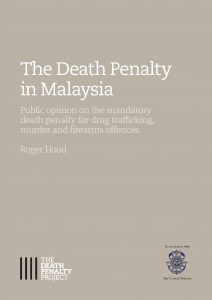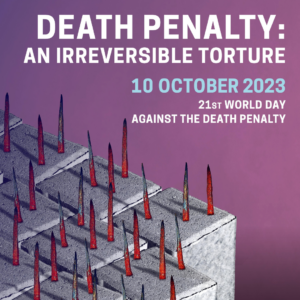
DPP Launches Report on the Public Opinion Survey on the Mandatory Death Penalty in Malaysia
- News
- 8 Jul 2013
In association with the Bar Council Malaysia, the DPP today launched a report of the findings of a public opinion survey on the mandatory death penalty.
The event, held at the Bar Council Malaysia was attended by over 100 guests including the Chief Justice of Malaya, senior members of the judiciary, lawyers, members of the diplomatic community, academics and NGOs.
In October 2012, the DPP commissioned Professor Roger Hood, Professor Emeritus of Criminology at the University of Oxford, to design and analyse the findings of a public opinion survey on the mandatory death penalty in Malaysia. The survey of a representative sample of 1,535 Malaysian citizens from all over the country, was carried out by Ipsos Malaysia, a leading market research company.
The research was designed to elicit views on the mandatory death penalty for drug trafficking, murder and offences under the Firearms Act. By using a series of scenarios it shows the extent to which members of the public support the mandatory death penalty when faced with the reality of having to judge whether the crime merits the death penalty.
Saul Lehrfreund and Parvais Jabbar, Executive Directors of The Death Penalty Project, said:
This study, for the first time, provides unique data from a large scale and detailed analysis of the views of the general public on the mandatory death penalty in Malaysia. The findings suggest that there would be little public opposition to abolition of the mandatory death penalty, in particular for drug trafficking, murder and firearms offences. We hope that this evidence will urge the Malaysian Government to consider legislative reform – in line with both public sentiment and international human rights standards.
Summary of findings
In Malaysia, the death penalty is the mandatory and, thus, the only punishment available to the courts for persons convicted of murder; for trafficking in narcotics in various amounts; and for discharging a firearm during the commission of various crimes, even if no-one is hurt. There is a growing political and public debate. Should the mandatory death penalty be abolished and replaced by a discretionary system where capital punishment is used only in exceptional circumstances, or abolished altogether? This study reports the findings of a major public opinion survey of the views of a representative sample of 1,535 Malaysian citizens on this issue. A large majority said they were in favour of the death penalty, whether mandatory or discretionary: 91% for murder, 74 to 80% for drug trafficking depending on the drug concerned, and 83% for firearms offences. Concerning the mandatory death penalty, a majority of 56% said they were in favour of it for murder, but only between 25% and 44% for drug trafficking and 45% for firearms offences.
When asked to say what sentences they would themselves impose on a series of ‘scenario’ cases, all of which were subject to a mandatory death sentence, a large gap was found between the level of support ‘in theory’ and the level of support when faced with the ‘reality’:
- For none of four scenario drug trafficking cases did more than 30% choose the death penalty, even when one case involved smuggling 25 kg of heroin. Only 8% chose death for all the scenario cases they judged
- Regarding 6 murder scenarios, a majority chose death for only 3 of the cases, the highest proportion being 65% for a recidivist robber
- Of the 56% who said they favoured the mandatory death penalty for murder whatever the circumstances, only 14% of them actually chose the death penalty for all the scenario cases they judged. This was only 8% of the total number of respondents
- When judging two scenarios where a firearm had been discharged during a burglary, only 20% chose death in the most serious case where the person fired at had been wounded
- Only 1.2 persons in 100 thought that the death penalty was the appropriate punishment for all 12 scenario cases of murder, drug trafficking and firearms offences that were judged – showing decisively that the vast majority favoured a discretionary use of the death penalty
- The main reason why people chose the death penalty was retribution and when against it they said it would be a disproportionate punishment. Deterrence was mentioned by no more than 15%
- When interviewees were asked whether they would support the death penalty if it were proven that innocent persons had been executed, the proportion in favour for murder fell to 33%, for drug trafficking to 26%, and to 23% for firearms offences
- ‘Greater number of executions’ was ranked as the least-effective policy for reducing very violent crimes leading to death and for reducing the amount of trafficking in illegal drugs
- These findings suggest that there would be little public opposition to abolition of the mandatory death penalty for drug trafficking, murder, and firearms offences. Public support for the death penalty for murder is also lower than is perhaps assumed, so may not be regarded as a definite barrier to complete abolition
Related media articles:
Malaysians believe in death penalty, but not willing to met it out, survey shows
High time to end mandatory death penalty
Survey shows little public opposition to abolishing mandatory death penalty
M’sians ignorant about mandatory death penalty, survey shows
M’sians in favour of discretionary death sentence, says survey
Malaysian popular support for mandatory death penalty overstated
Presentation by Roger Hood, Professor Emeritus of Criminology on the Death Penalty



















